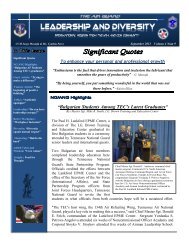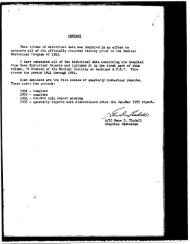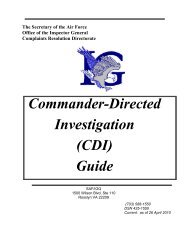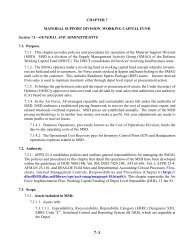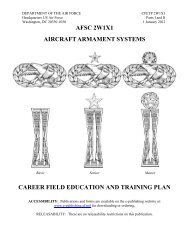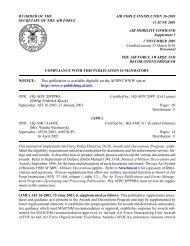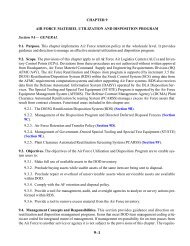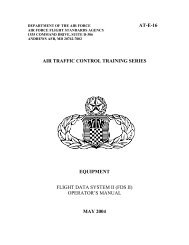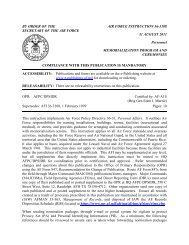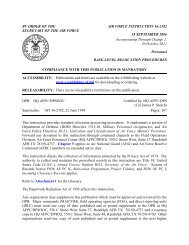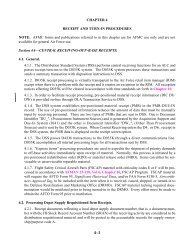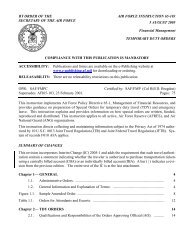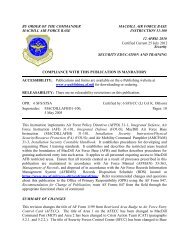Energy Panel Colonel Ron Torgerson, USAF Ret. Dr ... - Air Force Link
Energy Panel Colonel Ron Torgerson, USAF Ret. Dr ... - Air Force Link
Energy Panel Colonel Ron Torgerson, USAF Ret. Dr ... - Air Force Link
You also want an ePaper? Increase the reach of your titles
YUMPU automatically turns print PDFs into web optimized ePapers that Google loves.
<strong>Energy</strong> <strong>Panel</strong> - AFA - 9/17/12<br />
with the House. The most important for us is to do what we can<br />
to encourage all the services to act upon energy efficiency<br />
initiatives to reduce costs. What we’re really looking for most<br />
of all is to provide [inaudible] that have the most direct impact<br />
on the warfighter, whether it be more efficient engines, whether<br />
it be more efficient facilities. We really look at any dollar<br />
saved in energy is a dollar we can provide somewhere else in the<br />
fight.<br />
In the process you’ll see normally us working on provisions<br />
that allow for the services to provide in some cases a<br />
prescriptive approach to allow [inaudible] benchmark of your<br />
consumption, energy metering, things like that, to provide a<br />
better understanding of what we’re consuming in order to direct<br />
efforts to where we can save.<br />
As far as the overall emphasis, particularly on our<br />
committee over the past couple of years, is really focusing<br />
investments on where there’s the most direct impact to either<br />
conserving fuel [inaudible] or return on investments where you<br />
can see a real dollar savings over a short period of time.<br />
There’s been some recent controversy regarding some of the<br />
actions on the part of Congress, particularly by the Senate, as<br />
far as what we’ve put in the FY13 bill, the use of particularly<br />
biofuels and DoD invested in some biofuels. There’s some concern<br />
out there that, those of you who follow Congress, and I don’t<br />
encourage that, but those of you who follow Congress know that<br />
the Senate has passed some language that seeks to ensure that the<br />
money that we’ve spent, particularly in operations and<br />
maintenance, goes towards real readiness requirements and the<br />
funding that’s used for developing or expanding the [inaudible]<br />
is funded with [RDC] accounts. There’s been some back and forth<br />
between the Secretary of the Navy. The committee has some<br />
concerns with what the Secretary of the Navy spent on the Green<br />
Fleet in [inaudible] a few months ago, and it’s caused us to<br />
relook what the services are doing, and to make sure that we’re<br />
not going overboard [inaudible] with some of our [inaudible]<br />
investments, and focusing really on the initiatives that have the<br />
most, and the most apparent and most near term payback<br />
[inaudible].<br />
I think that’s pretty much all I want to talk about. I want<br />
to leave time for questions. But I also want to say I do believe<br />
that from a congressional perspective the <strong>Air</strong> <strong>Force</strong> program seems<br />
to be more prudent [inaudible] to encourage, and that is to<br />
develop technologies, develop initiatives that can save lives on<br />
the battlefield, reduce energy consumption, fuel consumption in<br />
engines, and make ourselves more efficient and more effective<br />
over the long run.<br />
- 6 -



